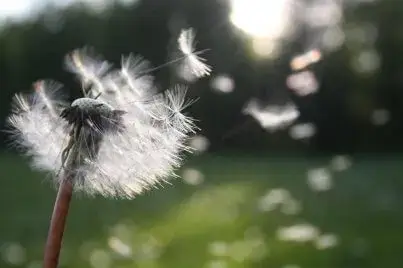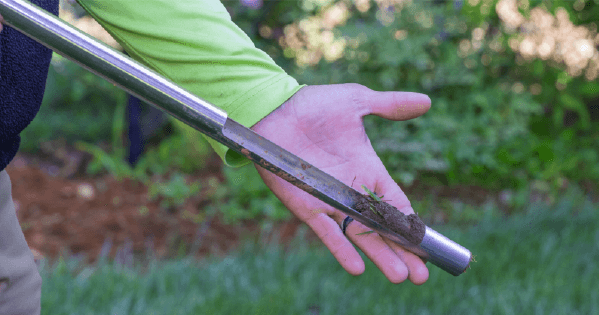Year-round Weed Control: Tackling Common Lawn Invaders in Georgia

Weeds are a problem year-round for Georgia homeowners. Warm season weeds such as dandelion, crabgrass and chickweed can take over from late spring to early fall. Henbit and white clover are common cold weather weeds that thrive from late fall to early spring.
No matter the season, Simply Green Lawn Care Plus is ready to battle common lawn weeds to keep your grass healthy all year.
Identifying and Controlling Warm Season Weeds
Understanding how warm season weeds spread throughout your lawn is the first step to getting them under control. Below are the three most common warm season weeds that invade Georgia lawns during late spring to early fall.
Crabgrass
This frustrating invader is one of the most typical weeds in the South. It’s easily identified by its coarse, yellowy-green leaves that grow in a star shape. Crabgrass is so hardy, it can grow between cracks in concrete and quickly take over a lawn.
This low-growing, annual weed spreads when long stems flop over, touch the ground, and sprout secondary stems. Crabgrass seedheads develop in late summer to early fall, and each one can scatter thousands of seeds. Controlling crabgrass at first sight is the best way to stop this tough weed from spreading. Applying pre-emergent herbicides in the early spring and post-emergent herbicides when plants are still young are the best ways to stop the spread of crabgrass.
Dandelion
Dandelion can hide in a lawn for a whole season before its trademark yellow flowers appear during the second year of growth. Dandelion blooms from early spring to late fall and produces viable seeds within days of flowering. Seeds germinate quickly after plants sprout creating up to 15,000 seeds per plant. Blooms last up to 15 weeks before the flowerhead turns into a wispy white ball of seeds that blow throughout the lawn on breezy days.
To control dandelion, apply a pre-emergent herbicide to the lawn before seeds germinate. A post-emergent herbicide may be necessary if you see dandelion growing. At first sight, dandelion appears as a cluster of leaves that form a rosette pattern.
Chickweed
This weed produces bright green, oval, and pointy large leaves at the top of the plant and smaller leaves at the bottom. When in bloom, tiny, white flowers with five petals form the shape of a star. Chickweed reproduces by seed or through root cuttings. It also can survive in the digestive systems of small birds and other animals, and can be transported by ants.
Although chickweed plants die in late summer or early fall, their seeds can germinate during fall or early spring. Seeds lay dormant throughout winter. Applying pre-emergent herbicides in late winter or early spring can prevent weed growth. If growth occurs, applying post-emergent herbicides can kill young plants.
Identifying and controlling cold season weeds
There are a few common weeds that grow best during the cold seasons. White cover and henbit are two stubborn winter weeds that can sneak up on homeowners if they don’t catch it right away. Here’s a look at these two most common winter weeds.
White Clover
Three oval-shaped leaves marked with a white crescent band is the first sign white clover is sprouting in your lawn. It grows low to the ground and spreads into dense mats. When small white flowers bloom, seeds form and eventually fall to the ground where they lay dormant for long periods of time.
White clover seeds germinate in cool, moist soil, so the best time for weed control is late fall and early spring. Applying pre-emergent herbicides in fall and early spring can prevent white clover from growing. Applying post-emergent herbicides at the first sign of white clover, can prevent it from taking over your lawn.
Henbit
Henbit has rounded, scalloped-edged leaves with a wrinkled texture. Its stems are square-shaped, a common feature of plants in the mint family, and are usually green to slightly purple in color. Henbit produces small, tubular flowers that are usually pinkish-purple with darker spots. In mild climates, henbit can bloom throughout the winter.
Henbit seeds are tiny and shiny with a teardrop shape. Each plant can produce hundreds of seeds that germinate when the ground is cold and wet. Removing plants before the go to seed is the best way to control henbit. Controlling henbit when plants have gone to seed requires applying a pre-emergent herbicide in the fall. If plants appear, apply a post-emergent herbicide on a warm day when temperatures are above 50 degrees.
Simply Green can help!
Simply Green Lawn Care Plus has the treatment plan right for your Georgia grass. If your lawn is overgrown with these common weeds described above, contact Simply Green today for a free consultation.
About Simply Green Lawn Care

Simply Green aims to provide the highest quality lawn care, mosquito control, and lawn pest control services to Georgia residents.
We are locally owned and operated which allows us to be accessible, attentive, and responsive for customers in Georgia.
Our well-trained team is easy to work with and determined to exceed expectations.
All our plant health care specialists are Georgia Department of Agriculture Certified and maintain their Category 24 applicators license.

